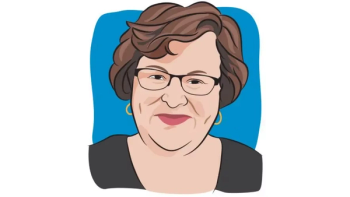
First U.S. Patient Treated in Study of Novel Drug-Chemo Combo for NSCLC Subset
Work is underway in the global phase 3 HARMONi study evaluating the combination of ivonescimab and chemotherapy in the treatment of patients with EGFR-mutated, locally advanced or metastatic non-squamous non-small cell lung cancer.
The first United States-based patient has been treated in a study evaluating ivonescimab plus chemotherapy for epidermal growth factor receptor (EGFR)-mutated, locally advanced or metastatic non-squamous non-small cell lung cancer (NSCLC).
“Advanced or metastatic non-small cell lung cancer is such a devastating diagnosis for patients,” Dr. Ian Anderson, medical oncologist at Providence Medical Foundation, who treated the first patient in HARMONi, said in a press release from Summit Therapeutics, the manufacturer of the drug. “While we are making great strides as a medical community to improve the quality and duration of patients’ lives, there remains significant room for improvement in the treatment options available for these patients. In particular, for patients with an EGFR-mutated tumor whose tumor has progressed after their initial TKI therapy, there are limited options.”
Researchers aim to examine the combination’s impact on patients who have been previously treated with a third-generation EGFR tyrosine kinase inhibitor (TKI), such as Tagrisso (osimertinib), in comparison to a placebo plus chemotherapy. The main goals of the study is to assess overall survival (the time from treatment until death of any cause) and progression-free survival (the time from treatment until death or the disease worsening), according to the release.
Researchers conducting the phase 3 HARMONi study anticipate enrolling approximately 470 patients from the United States, Canada, Europe and China, according to the study’s listing on ClinicalTrial.gov. The estimated study completion date is January 2026.
Ivonescimab, an investigational bispecific antibody, works as both a PD-1 inhibitor — meaning that it blocks a protein that helps cancer cells hide from the immune system, in turn helping the immune system recognize and attack cancer —
and a VEGF inhibitor, blocking the VEGF protein that stimulates the growth of new blood vessels and making the blood supply needed for tumor cells to grow unavailable.
Researchers believe that due to the design of the drug, ivonescimab will mainly attack cancer cells and largely leave healthy tissue alone, thereby reducing side effects.
More than 750 patients have been treated with ivonescimab as part of clinical studies in China and Australia, and Summit said they will share additional details on the treatment “at upcoming medical conferences.”
For more news on cancer updates, research and education, don’t forget to




